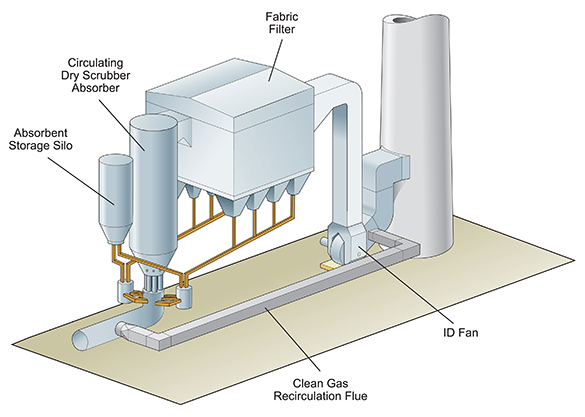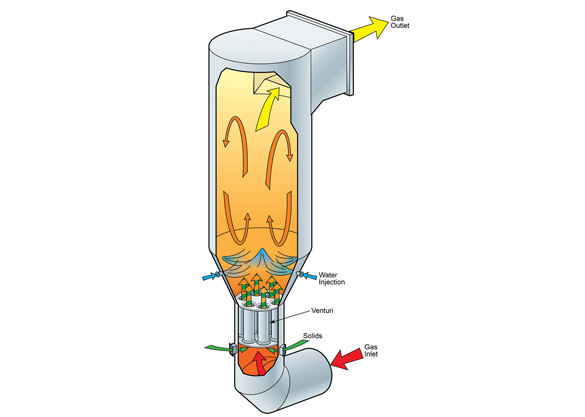Circulating Dry Scrubber (CDS)
B&W’s circulating dry scrubber (CDS) technology is ideal for smaller units that are firing medium to high sulfur coals. Compared to wet FGD systems, capital costs are lower for CDS systems with the potential for higher SO3 reduction and lower particulate matter (PM) emissions due to the integral B&W pulse jet fabric filter. In addition, the CDS may fill other site specific needs and is ideal for plant locations with limited space because of its smaller footprint. Like the spray dryer absorber (SDA), the CDS creates a dry solid byproduct and does not require a wastewater treatment.
Benefits of a CDS:
- High SO2 removal efficiency
- Integral SO3, HCl, HF, mercury, heavy metals, dioxins and furans, and PM2.5 emissions reduction
- Fuel flexibility to handle higher sulfur coals
- Low capital cost
- Low auxiliary power use
- Low operational and maintenance costs
- Dry reagent preparation and recycle system operation
- Low fresh water consumption
- Integral consumption of plant waste water streams for zero liquid discharge (ZLD) operation
- Absorbent feed independent of water injection (compared to an SDA)
When integrated with our fabric filter and dry sorbent injection technologies, our CDS offers a packaged approach to particulate, mercury and acid gas control.


Featured Project
B&W provides CDS system for Alliant Energy’s Lansing Station
B&W optimizes its circulating dry scrubber design for each application. This approach provides the end user with an optimized system to reduce long-term power and lime consumption, while providing reliable operation across wide load and fuel ranges, along with lower maintenance costs. See a description of this B&W project at Alliant Energy’s Lansing Station.
 Coupled with B&W’s particulate control equipment, CDS technology has the potential for higher emissions reduction and lower capital costs compared to other FGD technologies.
Coupled with B&W’s particulate control equipment, CDS technology has the potential for higher emissions reduction and lower capital costs compared to other FGD technologies. The circulating dry scrubbing process creates a dry solid byproduct and does not require wastewater treatment.
The circulating dry scrubbing process creates a dry solid byproduct and does not require wastewater treatment.